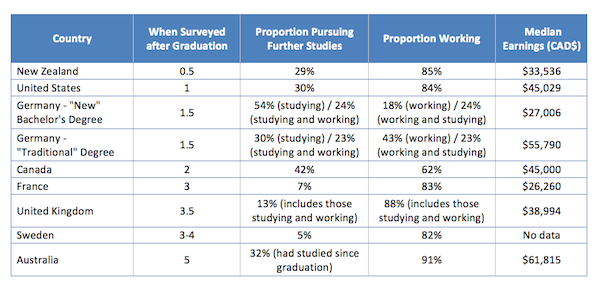What do Canadian students do when they’ve finished their university studies? And how do they differ from students in other parts of the world? We recently had the opportunity to examine country-level graduate surveys around the world.
Now, there are important caveats – no two countries conduct the same survey among the same exact population of graduates at the exact same time (and international data agencies like the OECD restrict most of their graduate analysis to fairly basic indicators, such as employment rates and earnings). Fortunately, centrally-coordinated surveys in Canada, Australia, France, Germany, New Zealand, Sweden, the United States and the United Kingdom permit meaningful international comparisons of life after a Bachelor’s degree.

So how do Canadian Bachelor’s degree-holders compare? For one thing, those who decide to work (excluding those who work and study part-time) report the second-highest earnings among the countries examined here, along with the U.S. – around $45,000 annually.* German students with a “traditional degree” report earnings of CAD $55,000.
More interesting, though, is the proportion of Canadian graduates who pursue further education. According to Statistics Canada’s National Graduates Survey, 42% of Bachelor’s degree-holders from the class of 2005 had pursued a new course of study by 2007; only 62% of Canadians were working (some did both). No one, other than German graduates of “new” degree programs, studies as much after completing an undergraduate degree than Canadians – even those who were surveyed in other countries much longer after graduation were less likely to return to school.
Of the 42% of Canadian graduates who went on to pursue an additional program (the number of students who pursued any kind of schooling, either within the context of a program or one or more individual courses, is closer to 75%), only 16% had completed their studies when surveyed two years after graduation.
Of course, not all students are as gung-ho about pursuing post-graduate education. Looking at graduates at all levels, while 62% of life-science graduates and 56% of humanities graduates went on to pursue another program of study, the same was true for less than one-third of architecture and engineering students. Education graduates were most likely (64%) to pursue individual courses after graduation; however fewer than 20% undertook a structured program.
Whether a Bachelor’s degree doesn’t confer the benefits Canadians students anticipate or whether it cultivates a thirst for learning that can only be quenched in the classroom isn’t clear. What is certain, though, is that most Canadian undergraduates aren’t ready to stop studying.
* Australian graduates actually reported higher earnings – $61,000 vs. $45,000 in Canada and the U.S., but they were surveyed five years after graduation, compared to one to two years in Canada and the States.

 Tweet this post
Tweet this post
